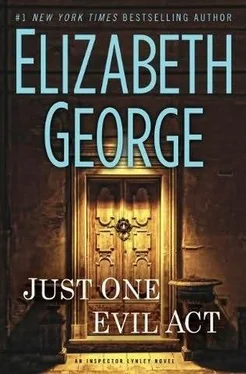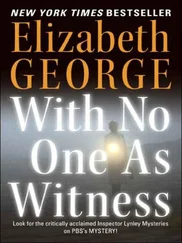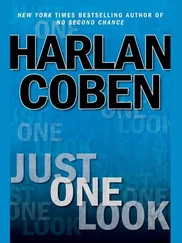Damn but she was in Oxford Street, she told him. She was on her way home, though. Was it . . . Had he heard . . . Was there something she should . . . ?
He said he would wait for her. He himself was at home, having just spoken to Mr. Doughty.
“And?” Barbara said.
“We shall speak.” His tone told her the news wouldn’t be good.
She made decent time back to Eton Villas, a miracle considering she had to use the miserable Northern Line. She was carrying her purchases in the direction of her bungalow when Azhar came out of the ground-floor flat. He walked across to her and politely took two of her shopping bags. She said ta, and she tried to sound cheerful in keeping with the holiday season, but she could see from his face that the conclusion she’d drawn from his tone of voice on the mobile had been correct.
She said to him, “So what d’you want to drink, then, tea or gin? I’ve got both. It’s a little early for gin but what the hell. If we’re owed, we’re owed.”
He offered her a smile. “Ah. If only Islam allowed me to drink.”
“There’s always cheating,” she told him. “But I don’t want to be the one to corrupt you. Tea, then. Strong. I’ll throw in a teacake and let me tell you, I don’t do that for just anyone.”
“You are far too good to me, Barbara,” he said, but his smile was rote. He’d always been the most courteous of men.
Inside her small bungalow, Barbara lit the electric fire in the tiny fireplace and removed her coat, her scarf, and her gloves. She was of two minds about her knitted cap, though. Her hair had begun to grow out, but she still looked like someone who’d had recent chemo. Azhar had, from the first, been far too decent to mention the wreck she’d made of her hair. She reckoned he wasn’t about to change course now and query her on the topic of head shaving. So she thought, what the hell, and she tossed the cap along with everything else on the daybed.
She busied herself with making the tea and popping teacakes beneath the grill in her oven. The fact that she had butter for these and milk for the tea actually made her feel like a domestic goddess. She’d even spent the morning prior to her shopping spree putting her hovel into some kind of order. This allowed Azhar to sit at her table and even gaze into the kitchen area without being assaulted by the sight of her knickers drying on a line above the kitchen sink.
He didn’t bring her into the picture of his phone call to her till she had a pot of tea on the table, along with mugs, teacakes, and all the et ceteras. Then, maddeningly, he began with small talk about her Christmas shopping, her mother’s health, and Inspector Lynley having to face his first Christmas after the death of his wife. Finally, he told her he’d been to Bow at Dwayne Doughty’s invitation. At first he’d thought the news would be good. He reckoned that Doughty had wished to demonstrate in person how far his skills as a private investigator had taken him. But things turned out quite differently.
“He merely wished to settle the account,” Azhar said quietly. “Payment in person was preferable to awaiting a cheque by post during the Christmas season, evidently.”
“But what did he tell you? Anything?” Barbara also wanted to ask why Azhar hadn’t included her on this journey to the detective’s office. But she shook herself mentally and ordered her psyche to get a grip because, for God’s sake, this man’s daughter was missing and whether he took Barbara Havers with him to learn if she’d been found was hardly as important as her being found in the first place.
Azhar said, “He’d got the maiden name of Angelina’s mother. Ruth-Jane Squire. But that was as far as he was able to go because there was no indication through any of his sources that Angelina had used the name for anything: new passport, driving licence, forged birth certificate, or whatever else one might need a false name for.”
“And that was it?” Barbara asked. “Azhar, that doesn’t make sense. These blokes—private investigators—skate round the law all the time. They look through people’s rubbish, they hack into phones, they hack into their email accounts, they intercept their post, they use blaggers to—”
“Blaggers?”
“Some bugger on the payroll who’s willing to pretend he’s whoever he needs to be to get information: ring up Angelina’s GP and act like you’re her social worker or whatever and can you tell me if it’s true she’s been infected with syphilis, sir?”
He looked startled. “The point of this being . . . ?”
“The point of this being that people talk if you act like you’ve got a reason to ask them questions. Blaggers play on sounding more official than officials. So I’d’ve thought Doughty had a score of them available.”
“He has an associate,” Azhar told her. “A woman. But her part was to investigate airlines, taxis, minicabs, trains, and the Underground. She discovered nothing.”
“She was there? With Doughty? She made a report to you?”
“He had her report. I did not meet her.” Azhar frowned. “Was this somehow important? That I meet her?” He picked up his teacake, examined it, put it back on the plate. “I see that I should have taken you with me. You would have thought of this. I am . . . I was anxious, Barbara. When he rang me and said that we needed to meet as soon as we could, that he did not wish to speak to me of his news by telephone . . .” Azhar glanced away, and Barbara could see a heaviness settle upon him. “I thought he had her. I thought I would walk into his office and there she would be and perhaps even Angelina with her so that all of us could talk together and come to an agreement.” He looked back at her. “It was foolish of me, but everything about me has been foolish for many years now.”
“Don’t say that,” Barbara said. “Life happens, Azhar. We do things. We make decisions, they lead to consequences, and that’s how it is.”
“This is, of course, true,” he told her. “But my first decision was both thoughtless and irrational. I saw her, you see. From across the room, I saw her.”
“Angelina?” Barbara felt a leap of her heart, that indication of pure excitement coursing through her body. “ Where? ”
“There were other places to sit that day in the food hall. I chose her table.”
“Oh. When you met her,” Barbara said.
“When I met her,” he agreed. “I saw her and I made that decision to ask if I might join her although I had no right to make it.” He paused, either to consider his words carefully or to consider how saying them would affect his friendship with Barbara. “I decided then and there upon an affair with her. It was—I was—so very full of my . . . my ego. And so very stupid.”
Barbara wasn’t sure how to respond to this because she wasn’t sure how she felt about the information. It was no business of hers how the affair that had produced Hadiyyah had begun, she told herself. But just because something was in the past and not her business did not mean she was immune from speculating and from drawing conclusions. She just didn’t like her speculations. She liked even less her conclusions. And she disliked herself most of all because both of these—speculations and conclusions—had to do with her, with Barbara Havers, with thinking about what it might be like to be such a woman as Angelina Upman whom a man like Azhar looked upon and made decisions about, the sort of decisions that brought worlds to an end.
“I’m sorry about all of it,” Barbara said. “Not about Hadiyyah, though. I don’t expect you’re sorry about her either.”
“Of course I am not,” he said.
“So where do things stand? You paid Doughty for his time and efforts and now what?”
Читать дальше












